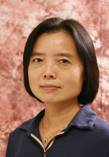Faculty of Information Technology

Academic Qualification:
Ph.D. in Computer Science, Meiji University, Japan, 1991.3
Bachelor in Computer Engineering, Shanghai Univerity of Technology, 1982.1
Teaching Area
PRINCIPLES OF COMPILERS
ARTIFICIAL INTELLIGENCE
DISCRETE MATHEMATICS
INELLIGENT INFORMATION PROCESSING
SPECIAL TOPIC IN SOFTWARE TECHNOLOGY AND APPLICATION (2) – MATHEMATICS & SOFT COMPUTING II
Research Area
Knowledge-based Systems, Intelligent Systems and Technology, Soft Computing, Fuzzy logic, Approximate Reasoning
Working Experience
2005.9 ~ Present Professor, Faculty of Information Technology, MUST
2002.9 ~ 2005.8 Professor and Dean, the School of Intelligent Systems & Technology, Inter-University Institute of Macau (IIUM), Macau.
1991.5 ~ 2002.8 Programme Director, Senior Lecturer, Senior Consultant, Project Leader, Institute of Systems Science (ISS), National University of Singapore (NUS), Singapore.
1993 ~ 1996 Project Leader, RWCP (Real World Computing Partnership, Ministry of International Trade and Industry, Japan) -ISS Lab.
Academic Publication (selected)
Ding, L., “Inference in Hybrid KBS with Interval-Valued Confidence”, proc. 2008 IEEE World Congress on Computational Intelligence / 2008 IEEE International Conference on fuzzy Systems (FUZZ-IEEE 2008), pp.1350-1357, Hong Kong, China, June 2008 .
Ding, L. & Lo, S.-L., “Truth Value Flow Inference in Hybrid KBS Constructed by KWS”, the 3rd International Conference on Innovative Computing, Information and Control , Dalian, China, June 2008 .
Ding, L., “A Model of Hierarchical Knowledge Representation ¾ Toward Knowware for Intelligent Systems”, Journal of Advanced Computational Intelligence & Intelligent Informatics , Vol. 11, No. 10, pp. 1232-1240, 2007 .
Ding, L., “Design and Development of Knowware System”, the 2nd International Conference on Innovative Computing, Information and Control , Kumamoto, Japan, Sep 2007 .
Ding, L. & Nadkarni, S., “Automatic Construction of Knowledge-Based System Using Knowware System”, the 6th International Conference on Machine Learning and Cybernetics , pp. 789-794, Hong Kong, China, Aug, 2007 .
Ding. L., “Knowware System for the Development of Intelligent Systems” (English), proc. the 7th International Conference on Intelligent Technologies (InTech2006), pp. 201-210, Taipei, Dec 2006 .
Ding, L., “A Model of Hierarchical Knowledge Representation – Toward Knowware for Computing with Words”, proc. the 6th International Conference on Intelligent Technologies (InTech2005), pp.188-197, Thailand, Dec 2005 .
Ding, L., editor and contributor, A New Paradigm of Knowledge Engineering by Soft Computing , World Scientific, 2001 . 374 p.
Ding, L., & Mukaidono, M, “Satisfaction Measure for Result in Fuzzy Reasoning and Retrieval -- An Attempt towards the Application of Fuzzy Logic as the “Brainware” of the Internet”, the 9th IFSA (International Fuzzy Systems Association) Congress / NAFIPS'
Ding, L., “Methods of Revision Principle for Approximate Reasoning”, International Journal of General Systems , Vol. 28, No. 2-3, pp.115-137, 1999 .
Ding, L. & Lui, H.C., “A Knowledge-based Approach Applied in Intelligent Hand Written Form Processing”, Journal of Advanced Computational Intelligence , Vol. 3, No. 3, pp.193-199, 1999 .
Ding, L., Teh, H.H., Wang, P.Z. & Lui, H.C., “A Prolog-like inference system based on neural logic”, Fuzzy Sets and Systems , Vol. 82, No. 2, pp.235-251, 1996 .
Professional Society Membership
Japan Society for Fuzzy Theory and Systems (SOFT)
Institute of Electrical and Electronics Engineers (IEEE)
